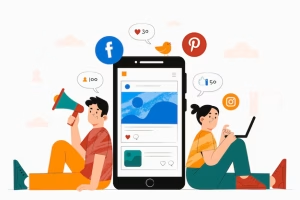Key Points
- Empathy Drives Connection: Drug rehab digital marketing uses compassionate messaging to build trust, inspiring individuals to seek life-changing treatment.
- Google Ads Boost Visibility: Targeted PPC campaigns on Google Ads reach high-intent users searching for rehab, maximizing conversions.
- Social Media Targets Precisely: Platforms like Facebook allow hyper-specific demographic targeting, connecting with those seeking addiction recovery.
- SEO Enhances Organic Reach: Optimizing for keywords like “drug rehab near me” drives organic traffic, complementing paid campaigns.
- Compliance Ensures Ethical Ads: Strict regulations, like Google’s certification, ensure drug rehab ads are trustworthy and avoid exploitative tactics.
Introduction
Drug rehab digital marketing is a powerful tool for connecting addiction treatment centers with individuals and families seeking help. With the rise of digital platforms, treatment centers can reach those in need with precision and empathy. This article explores effective strategies, regulatory considerations, and best practices for creating impactful digital marketing campaigns for drug and alcohol rehab facilities. By leveraging the right tools and approaches, marketers can guide people toward recovery while maintaining ethical standards.
Understanding the Target Audience
Successful drug rehab digital marketing starts with understanding the audience. Individuals struggling with addiction often feel isolated, ashamed, or hopeless. Marketing campaigns must address these emotions with sensitivity. Messages should emphasize hope, recovery, and the promise of a better future. For example, highlighting real recovery stories can inspire confidence in treatment programs.
Families and loved ones are another critical audience. They often search for solutions on behalf of someone struggling. Ads targeting this group should focus on support, accessibility, and professional care. Tailoring content to these distinct needs ensures campaigns resonate and drive action.\
Leveraging Google Ads for Reach
Google Ads is a cornerstone of drug rehab digital marketing. Pay-per-click (PPC) campaigns allow treatment centers to target high-intent keywords like “drug rehab near me” or “addiction treatment.” These ads appear when individuals actively seek help, increasing the likelihood of conversions. Setting up campaigns with precise geographic targeting ensures ads reach local audiences.
Google’s strict policies require addiction treatment advertisers to obtain LegitScript certification. This ensures ads come from accredited providers, building consumer trust. Optimizing ad copy with clear, empathetic language, like “Find Hope Today,” boosts engagement while staying compliant.
Harnessing Social Media Platforms
Social media platforms like Facebook, Instagram, and LinkedIn offer powerful tools for drug rehab digital marketing. These platforms allow hyper-specific targeting based on demographics, interests, and behaviors. For instance, ads can target adults aged 25–45 in specific regions who have shown interest in recovery-related content.
Video ads on platforms like Instagram Reels or Facebook Stories can showcase facility tours or client testimonials. These visuals create emotional connections, encouraging users to take the next step. Social media also supports cost-effective campaigns, making it ideal for treatment centers with limited budgets.
The Role of SEO in Drug Rehab Marketing
Search engine optimization (SEO) is a game-changer for drug rehab digital marketing. By optimizing websites for keywords like “alcohol detox” or “rehab programs,” treatment centers can attract organic traffic. Well-optimized content, such as blog posts addressing common addiction questions, builds authority and trust.
SEO also improves the performance of paid ads. A high-quality landing page with relevant keywords lowers cost-per-click on Google Ads. Combining SEO with PPC creates a comprehensive strategy that maximizes visibility and drives inquiries.
Crafting Compelling Ad Content
Ad content must be empathetic, clear, and actionable to succeed in drug rehab digital marketing. Headlines should grab attention without exploiting vulnerabilities. Phrases like “Begin Your Recovery Journey” or “Support for a New Life” inspire hope. Avoid clinical jargon that may alienate users.
Visuals are equally important. Images of welcoming facilities or supportive staff evoke trust and comfort. Videos showcasing recovery stories or program details can significantly boost engagement. Every ad should include a strong call-to-action, like “Call Now for Help” or “Explore Treatment Options.”
Navigating Regulatory Requirements
Drug rehab digital marketing faces stringent regulations to protect vulnerable audiences. Google and Facebook require LegitScript certification for addiction treatment ads. This ensures only legitimate providers advertise, preventing misleading claims. Federal laws, like those from the FTC, also prohibit false promises or exploitative messaging.
Ethical marketing is both a legal and moral necessity. Ads should focus on empowerment, never fear or shame. Compliance builds trust and ensures campaigns run without interruptions, reaching those who need help most.
Utilizing Data and Analytics
Data-driven strategies are essential for effective drug rehab digital marketing. Tools like Google Analytics track ad performance, showing clicks, impressions, and conversions. This data helps marketers refine campaigns for better results. For example, if an ad targeting young adults underperforms, adjusting keywords or visuals can improve outcomes.
A/B testing is another valuable tactic. Testing different headlines or images reveals what resonates most with audiences. Continuous optimization based on analytics ensures campaigns remain cost-effective and impactful.
Overcoming Marketing Challenges
Drug rehab digital marketing faces unique challenges. Stigma around addiction can deter individuals from engaging with ads. Campaigns must normalize seeking help with non-judgmental messaging. Budget constraints also limit smaller treatment centers. Digital platforms like Google Ads and social media offer affordable solutions through precise targeting.
Standing out in a competitive market is another hurdle. Unique selling points, like specialized programs or holistic therapies, help differentiate a center. Authentic, transparent ads build trust and set facilities apart from competitors.
The Power of Retargeting
Retargeting is a critical strategy in drug rehab digital marketing. Many individuals visit a treatment center’s website but leave without acting. Retargeting ads follow these users across the web, reminding them of available services. For example, someone who viewed a detox program page might later see an ad highlighting its benefits.
Retargeting keeps treatment centers top-of-mind, increasing conversion rates. Platforms like Google Ads and Facebook make setting up retargeting campaigns simple and cost-effective, maximizing return on investment.
Building Trust Through Transparency
Trust is vital in drug rehab digital marketing. Potential clients are often skeptical, fearing ineffective care or exploitation. Ads should highlight accreditations, like CARF or The Joint Commission, to signal credibility. Testimonials, when legally permissible, add authenticity.
Transparency about costs, treatment processes, and expectations reassures users. Ads stating “Insurance Accepted” or “Confidential Consultations” alleviate concerns. Clear, honest messaging fosters confidence and encourages individuals to seek help.
Measuring Campaign Success
Success in drug rehab digital marketing goes beyond clicks or impressions. Key performance indicators (KPIs) include phone calls, form submissions, or scheduled consultations. These metrics show how ads translate into real-world impact. A high click-through rate is valuable only if it leads to inquiries.
Regularly reviewing KPIs allows marketers to adjust strategies. If a campaign generates clicks but few calls, the landing page or call-to-action may need refinement. Success means helping people take the first step toward recovery.
FAQs
1. Why is empathy important in drug rehab digital marketing?
Empathetic messaging builds trust, reduces stigma, and inspires individuals to seek help without feeling judged.
2. How does Google Ads help treatment centers?
Google Ads targets high-intent keywords, ensuring ads reach people actively searching for rehab services.
3. What role does SEO play in rehab marketing?
SEO drives organic traffic, improves ad quality scores, and lowers costs for paid campaigns.
4. Why are regulations strict for rehab ads?
Regulations ensure ads are ethical, legitimate, and free from misleading claims, protecting vulnerable audiences.
5. How does retargeting improve ad performance?
Retargeting re-engages website visitors, keeping services top-of-mind and increasing the likelihood of conversions.
Conclusion
Drug rehab digital marketing is a lifeline for those battling addiction. By understanding audiences, leveraging platforms like Google Ads and social media, and prioritizing ethical practices, treatment centers can make a profound impact. SEO, retargeting, and data-driven strategies enhance reach and effectiveness. With clear, empathetic messaging and a focus on trust, digital marketing connects individuals and families with the help they need, guiding them toward recovery and hope.
Sources
Substance Abuse and Mental Health Services Administration – https://www.samhsa.gov
Federal Trade Commission – https://www.ftc.gov
Health Insurance Portability and Accountability Act Resources – https://www.hhs.gov/hipaa
National Association of Addiction Treatment Providers – https://www.naatp.org
Google Ads Help Center – https://support.google.com/google-ads
LegitScript – https://www.legitscript.com





